|
|

Sex Blogging, Gratuitous Nudity, Kinky Sex, Sundry Sensuality
ErosBlog posts containing ""anything worth doing on the internet""
May 19th, 2013 -- by Bacchus
The full implications of Tumblr making adult-flagged porn Tumblr blogs non-searchable, and hiding their content from the search engines, are only just starting to sink in for people.
For instance: if you have an adult tumblr, now you can’t even search your own blog to find an old post.
I’m getting panicky emails from people with huge adult Tumblrs, thousands of posts. Apparently internal Tumblr search has never worked well (you can search for one tag, or for blog names, but not for post content and there are no multi-keyword searches) and it’s impractical to scroll back very far in your own Tumblr dashboard. So they were in the habit of typing [keyword] [their own tmblr url] into Google, and hey presto! There would be the post they were looking for.
Now their blogs have a non-consensual robots.txt file that excludes Google, and all of those search results are gone from Google.
Worse yet? Tumblr blogs flagged “adult” aren’t searchable even with Tumblr’s own internal search. You can test this yourself. Log into your Tumblr dashboard, go to your settings, and make sure you haven’t checked the “Browse tag pages in Safe Mode (Hide content from NSFW blogs)” setting:
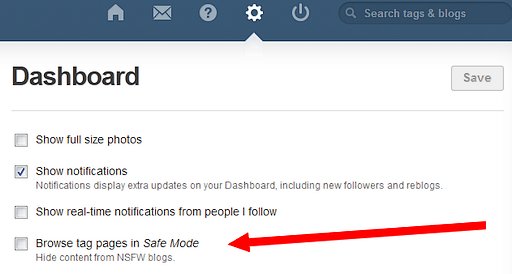
Unlike the one that doesn’t actually “allow search engines to index your blog”, this checkbox appears to actually work in the narrow sense that if it is not checked, you can search for blogs flagged “NSWF” within the Tumblr tag search interface. But this checkbox lies by omission. You’ve got the option to search tag pages of NSFW blogs (or not) but opting to search them does not let you search blogs that have the deeper-level-of-perdition “adult” flag.
My test for this is to search for a recent post at Wicked Knickers, which I used as my “adult” flagged example in the Thou Shalt Not Search Adult Tumblr Blogs post:

The post we will be looking for in the Tumblr dashboard tag search has a time stamp of 9:30pm yesterday, May 18, and is tagged “ziegfeld” which makes it a nice handy and recent thing to search for.

We already know that Google no longer has access to the posts on an adult-flagged Tumblr like this:
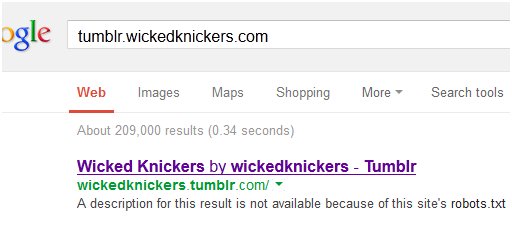
So, what happens in the Tumblr tag search interface? If you’re logged in, this is what you see when you search for tumblr posts with the “ziegfeld” tag. The posts returned are listed in date order (most recent first) and dates are visible as tooltips on the live page, so I’ve added them in the margin with red arrows and white text. You’ll see that the Wicked Knickers post is not returned by the Tumblr search:
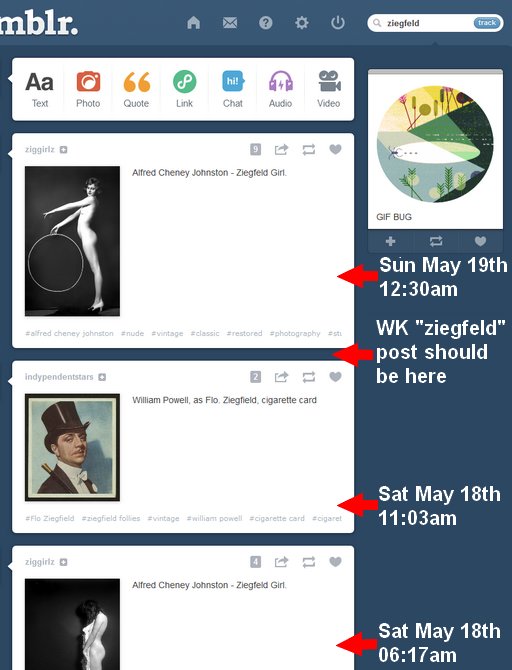
Interestingly, that logged-in Tumblr dashboard search result is displayed at a URL ( http://www.tumblr.com/tagged/ziegfeld ) that returns something very different (but still no sign of our Wicked Knickers post) if you navigate to it as a not-logged-in person:

Try it yourself if you’ve got an adult-flagged Tumblr blog. Log in and try to search for your own posts in the search box on your own dashboard. You will, sadly, fail.
So, what is to be done? How can you search your own Tumblr blog?
The answer is, quite simply, you cannot — not while it’s on Tumblr’s server behind their robots.txt that you do not have the power to alter or remove.
But, all is not lost. Be ye not in despair. If you could only back up your adult Tumblr blog — make a complete copy of it, on your local hard drive — you could search it there with any file searching tool. Or, if you have a web server of your own, you could upload that copy (mirror it) onto your own web space, where it would once again be indexed and searched by Google.
That’s all I got. It’s the only way. It’s also a very good idea, because eventually The Pornocalypse Comes For Us All, and because Anything Worth Doing On The Internet Is Worth Doing At Your Own Domain That You Control.
Your next logical question is “But how do I do that? How do I back up a Tumblr blog?”
It’s not a simple question. The answer isn’t simple either. But, it can be done. So, that’s my next post.
Similar Sex Blogging:
May 15th, 2013 -- by Bacchus
If you’ve got an adult blog on Tumblr, there’s a good chance Tumblr uses robots.txt to exclude the search engines from indexing it. Did you know that?
Two weeks ago in The Pornocalypse Comes For Us All, I wrote:
Who is next? My guess would be Tumblr. Tumblr is, of all the big platforms, perhaps the most porn friendly; there’s lots of porn on there and the Terms of Service do not prohibit it… But Tumblr is, famously, a popular platform in search of a revenue-generating business model. And we’ve learned that the suits have no loyalty to the porn users who made their platform popular. So, my bold prediction is that as Tumblr casts about for a business model, one of their steps will be to “clean this place up”…
And now, guess what? I’ve discovered that Tumblr uses robots.txt to bar all search engine access to blogs flagged as adult. If you’ve got an adult Tumblr, go look at your own settings. Do you see that first checkbox, the one that says “allow search engines to index your blog”?
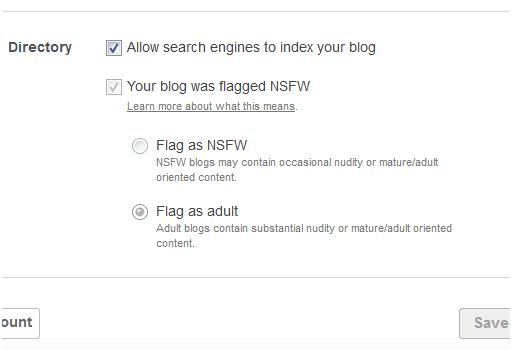
That checkbox is a lie. It’s nicely checked, it’s not greyed out, but if your blog is flagged “adult” it’s a lie. Do you see the “Learn more about what this means” link under “Your blog was flagged NSFW” selector? It leads to this page, where Tumblr requests users to appropriately self-flag their blogs:
Please respect the choices of people in our community and flag your blog as NSFW or Adult from your blog Settings page.
- NSFW blogs contain occasional nudity or mature/adult-oriented content.
- Adult blogs contain substantial nudity or mature/adult-oriented content.
If you’re not sure if you should flag your blog you can leave it unflagged, but keep in mind that we might flag it later if we see a lot of mature/adult-oriented content.
To answer the question “What happens to blogs that are flagged NSFW or Adult?” Tumblr offers this handy chart. The key piece of information is the white space indicated by my red superimposed arrow:

That’s right — where the “Blog indexed by Google” row intersects the “Adult Blogs” column, we find a ringing silence.
Would you have noticed? None of the adult Tumblr bloggers I know ever did. I knew from my porn researching that adult Tumblrs tended to be poorly represented in Google search results, but I chalked it up to the sheer scale of Tumblr and Google’s growing bias against returning porn search results. Nope, I found out the truth in one stark moment of astonishment, summed up by this image:
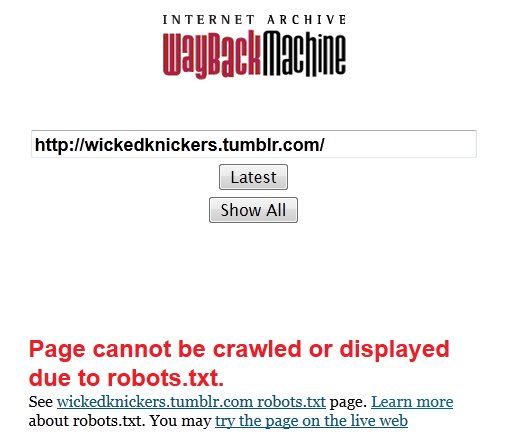
Let’s click the “See wickedknickers.tumblr.com robots.txt page” link:

From me: Aghast. Fucking. Gulp.
In robot, that means, roughly “All robots: stay out!” No search spiders allowed. No Internet Archive crawler. The Wicked Knickers tumblr is there, but you have to know about it, or you have to be linked to it. You won’t find it in Google, you won’t find it in any other search engine that honors robots.txt, and when Tumblr decides to stop hosting it, you won’t find the pages in the Wayback Machine — it will be gone for good, lost to humanity unless somebody with the technical chops and outlaw sensibilities of Archive Team finds a way to archive it anyway, robots.txt be damned.
Wicked Knickers is just an example, one that has some meaning to me because it’s one of the first Tumblr blogs I ever noticed, and I’ve been linking to it since 2010. That’s almost 6,000 vintage erotica posts since January 2009, and none of those pages are in Google or the Wayback Machine. It was only when I twigged to that anomaly that I finally understood what Tumblr is doing to adult blogs.
In all the years that I’ve been preaching Bacchus’s First Rule (“Anything worth doing on the internet is worth doing on your own domain that you control”), I’ll confess that I never considered the power of robots.txt, or what it means to be putting stuff on an internet site where somebody else controls what robots.txt says. Not only do they control your visibility to search engines, they control whether history will remember what you said. That strikes me as a high price to pay for a “free” blogging platform.
It’s worth noting that there’s still rather a lot we don’t know about the Tumblr robots.txt blockade on adult Tumblr sites. Unanswered questions include:
- Does Tumblr have any flexibility on this? Would their support, if asked, remove or modify the robots.txt barrier in specific cases?
- When did Tumblr start using robots.txt to block Google from adult blogs? Has it always been like this, or is it a recent innovation?
- Why does Tumblr display the misleading checkbox that falsely implies that search engines can see flagged adult blogs?
- What is the actual reason for excluding adult Tumblrs from search engine and (especially) archive crawls?
In an unusual move for me, I actually reached out to press@tumblr.com, told Tumblr I was going to write this post, and asked them for answers to those questions. That was on May 11th. No response so far. If they ever do answer, I’ll be sure to update this post.
Similar Sex Blogging:
May 1st, 2013 -- by Bacchus
Ask not for whom the pornocalypse tolls. It tolls for thee.
Recently I’ve been seeing lots of tweets and headlines suggesting that Amazon is going through another round of cracking down on porn ebooks, generally burying them deeper and making them harder to find (or, as their people would no doubt put it, making it harder for porn to pop up accidentally in general searches.) I haven’t paid a lot of attention, because I’m old and I’m weary and I’ve seen this pattern repeated over and over again throughout the internet age. Somebody builds a platform or service or community or whatever, it is even better with porn, lots of people use it for porn, it grows awesomely, eventually the suits get uncomfortable with all the porn that is at the foundation of their business, and so they try to marginalize it or (usually later in the process) drive it out entirely (though this often fails).
Smart people know that the internet (hell, any new technology disruptive enough to be interesting) is for porn. Remember why home VCRs exploded in popularity? How many of you Usenet veterans were motivated to get a Usenet feed (or a better feed than the on you started with) because of the porn groups? Smarter observers than me have noticed that the appearance of porn on your new platform is proof, of a weak sort, that your platform is important enough to matter:
I’d offer the hypothesis that any sufficiently advanced read/write technology will get used for two purposes: pornography and activism. Porn is a weak test for the success of participatory media — it’s like tapping a mike and asking, “Is it on?” If you’re not getting porn in your system, it doesn’t work. Activism is a stronger test — if activists are using your tools, it’s a pretty good indication that your tools are useful and usable.
There’s one sentence there that’s very important: “If you’re not getting porn in your system, it doesn’t work.” The suits always miss an important corollary: “If you’re trying to root out the porn in your system, you’re trying to break your own system.”
But, strive to break it they do. It’s a seemingly-inevitable phase in the growth cycle of any commercial “read/write technology”. (Although, these days, I’ve noticed that a lot of new platforms are attempting to bake “broken for grownups” into their products from the beginning. Pinterest and your “no nudity” TOS, I’m thinking of you! Google+ and your war on nyms, you also.)
The first one of these cycles I lived through was eBay in the early days. If you remember that far back (we’re talking mid 1990s) eBay was especially vital and amazing right after it got a critical mass of users, but before the whole world had figured out that old stuff was suddenly much more valuable now that there was an efficient mechanism for matching it to willing buyers. Basically there was a supply glut on nifty old stuff right at first, the accumulated collectibles of history all hitting the market at once. And this was as true for vintage porn (magazines and books and videotapes) as it was for any other genre of collectibles.
And it was AWESOME. I still have (in very deep storage) apple boxes full of vintage porn magazines I bought for less money than it cost to have them shipped to me via USPS media mail. Someday I’d love to get a high speed scanner and put them all up on the web Internet Archive style, but it would be a labor of years and I’d need a very wealthy and eccentric patron. Meanwhile, I preserve them as best I can.
But then Meg Whitman happened. It’s too many years ago now for me to recall how many successive waves of anti-porn activism swept the eBay auction platform, but it was many.
The adult items got their own section, it got put behind an age self-verification button, the adult items vanished from the general search, the adult section itself got removed from the category listing making it very hard to find, and then there was wave after wave of auction removals based on listing policies that were vague and erratically enforced. There were rules about how much nudity could show on magazine covers, there were wide-ranging keyword bans that meant you could not list (or show an uncensored photo of) the true titles of many porn items, there was a ton of selective enforcement, and there was an enormous chilling effect because seller accounts were often banned or limited based on first-offense violations of these deeply-murky rules.
It eventually became clear to everyone that Ebay under Meg Whitman (the former Disney exec) was now officially hostile to porn, where once it had been the leading sales platform for vintage porn especially. The market dried up, market offerings became bland and boring, and everybody who was on eBay for that reason had left. The suits, having stricken off the member that so offended them, declared victory and moved on. They broke it, but they like broken better. Broken is what they wanted, broken is what they got.
So now: is Amazon doing the same with erotic ebooks? To me it looks like early days, but yeah, I see the handwriting on the wall.
One high-profile erotica author, Selena Kitt, writes: “The Pornocalypse has begun. Amazon continues filtering erotica out of their All Department Search in large numbers.”
That’s true as far as it goes. My nascent Bacchus Media porn ebook project has one erotica title (a Victorian erotica classic that I repackaged for the Kindle back in 2009) for sale on Amazon, and sure enough, it’s flagged “Adult” and does not appear in an “All Departments” search. But it does appear in “Kindle Store” and “Books” searches, which strikes me as proper behavior. This is not (yet) a hidden and unsearchable category ghetto.
Not yet. But erotic authors are starting to feel the noose. Here’s Selena Kitt in another post:
Hey, does anyone remember when Amazon started banning erotic fiction?
Or when Apple removed “certain” titles from their bestseller lists?
Or when Paypal stopped paying for “certain types” of erotica?
When Amazon began excluding books from its “all department” search?
When Smashwords started cracking down on “nipples and floppy bits and dangly parts?”
Or when Apple began rejecting outright those books which contained “certain content” they didn’t agree with?
Or when Barnes and Noble stripped bestselling erotica books (in the top 100) of their ranks by 1,000 points?
And the new anti-porn pornocalypse rules get bizarre very quickly. Why would the largest bookseller in the world deny the existence of the Erotic Romance category? Back to the first Selena Kitt post I linked to:
Back when I hit the top 100 on Amazon, the competition wasn’t anywhere near as fierce as it is today. They didn’t know quite what to do with a naked woman’s bottom on their bestseller list.
That’s when they began the system that we are seeing them implementing now — what we in erotica circles call the “ADULT filter.” Back then, you were only filtered (which means that you were excluded from the all-department search, and your book didn’t appear in the also-boughts of any books that were not filtered, which was very limiting at the time!) if your book contained nudity on the cover.
So I slapped a thong on the woman on my Babysitting the Baumgartners cover and Amazon “unfiltered” my book. Sales resumed at their usual pace and life went on. But I had to figure out myself what the problem was, the reason the filter had been applied in the first place. There was no transparency on Amazon’s part. None. Nada. I even talked on the phone to an “Amazon executive customer service representative” who would only “confirm or deny” my suspicions.
I felt like Woodward and Bernstein talking to Deep Throat in a parking garage somewhere. That’s how bizarre and surreal the conversation was.
The media has recently picked up on Amazon’s latest attack on “porn,” but the Pornocalypse looks as if it’s just begun.
The filtering tool that Amazon previously only used to exclude nudity on covers is now being applied to books arbitrarily, but in very, very large numbers. We haven’t seen a purge this big on Amazon since they banned incest and bestiality in erotic work.
First of all, Amazon has now separated Erotica and Romance. I don’t know if erotic romance writers know this or have realized it yet, but Amazon has recently changed their policy (not that they’ve told anyone about it or anything!) and you can no longer put your book in BOTH Erotica and Romance categories. You have to choose one or the other. “Erotic Romance” as a category will now classify your book as “erotica.”
And be careful, because once you have labeled your book as “erotic,” they will not allow you to reclassify it as NOT erotic. The only exception to this rule I have seen so far is for traditionally published books (ala Fifty Shades). Self-published books don’t get this treatment.
Meg Whitman rides again, and this time her name is Jeff Bezos. My prediction is, the pornocalypse rules will get more restrictive and more opaque and more arbitrary. Erotica will never vanish from Amazon’s platform — just like it never vanished completely from Ebay — but its prominence in the success of the Kindle platform will be swept under the rug of history.
And make no mistake: erotica mattered to the success of the Kindle and to that of ebook readers in general. Here’s my own take on that from a few months ago, from a post I called Discreet Porn For Women:
It’s no secret that the rise of the portable e-book reader (whatever brand you favor) has triggered a quiet boom in the prose-porn-for-women industry. But if you’re a man and you’re like me, you may have been fooled by the unassuming “Erotic Romance” styling of the genre.
…
When a book was a physical artifact only, you had three choices. First, you could limit your reading to book-objects that wouldn’t get you more grief than you could handle, when you were observed with them by your friends and family. Second, you could limit your reading to times and places so private that your book-objects were physically secure from observation. Or, third, you could fudge, by reading book-objects that looked more innocuous than they were, placing them in the first category by courtesy.
Now the electronic reader gives you a fourth choice: read whatever the hell you want, where-ever the hell you want, and just flip closed your completely opaque personalized bejazzled leatherette Hello Kitty e-reader cover whenever anybody else gets too close to your screen. Throw in the Internet so you can buy whatever the hell you want without any witnesses, and the circle is complete. Your credit card statement says “Amazon” and your browser history says (at worst) “erotic romance” and it’s all so very safe from inspection, criticism, or judgment.
Here’s a confirming related visual found at Bondage Blog, talking about why an iPad is an awesome thing to have for looking at porn in public:

Selena Kitt puts the “porn built the Kindle” case even more strongly, from her erotica author’s perspective:
Jeff Bezos may have put out the product, but I made the Kindle into what it is today. Me, and legions of other erotica writers who were already writing it, and those who came later, who saw how much readers were clamoring for it. Readers could suddenly read erotica without anyone seeing the cover. The Kindle device made that possible, Amazon made the Kindle available… but I provided the content readers were surreptitiously reading under their desks at work and on the subway home.
…
THAT is what sold Kindles. Porn. Face it, Jeff Bezos. You owe the success of Kindle to me, and to every erotica writer out there making a living writing “porn.”
It’s true. And Jeff Bezos knows it. But Amazon is moving on nonetheless. The Pornocalypse comes for us all.
Who is next? My guess would be Tumblr. [2018 update: Did I call this or what?] Tumblr is, of all the big platforms, perhaps the most porn friendly; there’s lots of porn on there and the Terms of Service do not prohibit it. But if you surf Tumblr porn blogs for very long, you’ll notice that they get deactivated a lot. There are some kind of rules (not published anywhere) and if you break them (or, maybe, if somebody complains) you get nuked.
What is forbidden? Tumblr does not say. Maybe it’s age-play images that causes trouble (it can be hard to distinguish that stuff from illegal/pedo shit after all), maybe it’s rough sex photos that aren’t obviously consensual/commercial porn, maybe it’s scat or bestiality. It’s hard to say when all you’ve got to go by is the occasional non-working link with [deactivated] in it.
But Tumblr is, famously, a popular platform in search of a revenue-generating business model. And we’ve learned that the suits have no loyalty to the porn users who made their platform popular. So, my bold prediction is that as Tumblr casts about for a business model, one of their steps will be to “clean this place up” (for the VCs, for the advertisers, for the potential buyers, for somebody). A lot more porn tumblrs will go away when that happens.
The pornocalypse comes for us all.
Is there any defense against the pornocalypse? Not really. To be sure, if you follow Bacchus’s First Rule Of The Internet you can at least protect yourself from losing your data and intellectual property when the anti-porn suits decide to “clean up” whatever social publishing platform you might otherwise have been using. You remember my First Rule: “Anything worth doing on the internet is worth doing at your own domain that you control.”
Unfortunately I wrote that before the true social power of platforms became fully apparent to me. You can protect your physical stuff from loss if you keep it buried in a cave, too, but what good is it if people can’t see it and play with it?
Social media platforms, publishing platforms, auction platforms, online stores, all of these benefit from the network effects of their many connected users, and increasingly they are turning into self-contained silos that aren’t sufficiently connected to the open internet. Following the First Rule protects you from loss, but it doesn’t expose you to gain as well as I thought it did, back in 2004 when I first wrote it down. Back then I believed in the power of the open web and in the impartiality of Google. You make a cool porn thing, you put it on the web, people will find it, joy and orgasms and profit for everybody.
But here in 2013 things look very different. What’s more useless than an iPhone app that isn’t allowed into the Apple store? If you publish that bad boy on your own domain, Google won’t surface it well for searchers and Apple won’t let them install it if they did find it. Nope, the First Rule is not enough.
If you want to play, you have to play where the people are. If you do anything with erotica and porn, that means shunning the platforms where you’re wholly unwelcome, pushing yourself as far as possible onto the platforms where you’re somewhat tolerated, and enthusiastically exploiting the platforms where you’re truly welcome.
But even when you do all this, it’s important to understand that companies and platforms have life cycles, and there seems inevitably to come a time in all of them where porn that was formerly welcome (often, porn that played a fundamental role in building the popularity of the platform) will get kicked to the curb or shoved behind a sleazy curtain at the back of the store. Although I believe in making this process as embarrassing and painful as possible for the companies that do it, I don’t really believe it can be prevented, or even mitigated much. All you can do is expect it, prepare for it, diversify as much as possible onto as many platforms as possible, and stay agile.
The pornocalypse comes for us all.
Similar Sex Blogging:
November 13th, 2011 -- by Dr. Faustus
So you’ve found someone you’d like to work with out there on the wide wild web. What now?
The first question worth asking yourself is, how do I present myself? A good place to begin would be to have a public presence where you can show a potential partner that you’re for real and what you’re into. There are many ways that you might do this, but I happen to think that setting up a site of one’s own and doing a little writing is an excellent start.
Write down what turns you on. Try to make that into a vision and publish. Don’t be shy. You can use a pseudonym if you want (I do!). About two years ago, after having diverted myself with writing a sequence of weird and porny screenplays that I’m pretty sure will never be acted out in front of a camera, I sat down and wrote an illustrated essay about what I really liked. This essay became A Thamatophile Manifesto, and together with that strange screenplay material, became the foundation for the site Erotic Mad Science. Then I started blogging about what I was into, writing posts as simple as “Look! A concept or image makes me squee (even if it makes others squick)!” or “Wow — here’s a provocative historical forerunner of one of my own kinks!” The useful outcome of all this activity (which, okay, maybe I took a little far) was that when I started looking for creative partners to commission I had a rich bed of source material to point to and say: here is what I am into — do you think you’re sufficiently interested in it to want to join me in working on it?
And I do think it is important for your creative partners to, in at least some degree, share your enthusiasms. If they do, they’ll be much better able to understand what it is that you’re asking them for when you place commissions. The art they work with you on creating will be sexier, because they’ll engage and have some of themselves in it. And they’ll be able to come up with ideas that contribute positively to the projects you work on.
A note about setting up sites and publishing. There are tons of places on the Internet that will allow you to do this for free, but as a general matter I endorse Bacchus’s First Rule of the Internet: “Anything worth doing on the Internet is worth doing at your own domain that you control.” Anyone who’s done anything with erotica for any length of time knows horror stories: material deleted, accounts canceled, creators banned. You and your material are much safer if you set up your own domain. Sure, there are some up-front costs, but it’s easy to find someone out there who will register your domain and host your site and leave you alone as long as you pay the rent, which will work out to pennies a day if you get anything remotely like a good deal. With tools like WordPress available (for free!) it is easy to be up and running with a good-looking, customized site in a few hours. And of course, you will look a lot more for real if your domain name reflects your Internet identity.
Approach with respect. If you’ve found someone whose work you like and who want to commission, get in touch. Explain what you like about their work and inquire whether they might be interested in accepting a commission. There’s nothing rude at all about this. Remember: creators who publish on the Internet are out there because they want to be found, and in general, they want to hear from you. One good thing to try, especially if you have a site of your own, is to ask permission to publish an image or story-excerpt or whatever of theirs on your site (with attribution, of course). This is an effective way to communicate your admiration of their work, and as long as the request is reasonable, they will generally say yes.
When it comes matters of money and commission cost, be courteous but matter-of-fact and businesslike. Other creators have opportunity costs for their time and just like you they have to eat and pay the rent, and generally they’ll be able to tell you what they need to charge to do a given piece of work.
Don’t be afraid to ask in detail for what you are looking for. Here is an example of where it pays to have done preparatory work for what you’re into, because it will help another creator figure out what you might like, but at the same time, don’t be afraid to write a detailed script. (Your preparatory work writing on your own site will help a lot here to, because you’ll get in the habit of describing what you like in detail.) When working with a visual artist, use of visual references is also an excellent idea. For example, when working with Lon Ryden on the character design for Bridget O’Brian (one of the four adventuresses in the current Tales of Gnosis College story Study Abroad), I suggested basing her on Clara Bow. (A 1920s screen goddess not too much remembered today, except perhaps for some astonishing rumors which turn out not to be true.)

Lon’s artistry then resurrects the 1920s sex bomb as an early 21st century college student (how’s that for practicing mad science?):

Ask for what you want, and more often than not, you’ll come away happy.
Finally, and I think centrally important, remember that your creative partners are partners, not servants, and that this is true even when you’re paying them. If you’ve selected them well, they are people who are sympathetic to what you’re into. They’ve read what you’ve written and looked at visual images that turn you on and they have taken on your projects. Remember that they are creators in their own right. If you trust them, they can and will contribute to what you’re doing. They will have ideas about how to do things. You don’t necessarily have to accept them, but remember that they are often very good at what they do and often might think of ways to do it better. Take them seriously. Among the more gratifying experiences you can get as a co-creator is working with someone who has become sufficiently into what you’re doing that you no longer always have to write a detailed script or commission: you can just outline it and have gratifying results come back. You can get to that point, but you need to establish respect and trust, which you easily do if you use decency and common sense and keep the maxim of this paragraph in mind.
You can do it. I know you can.
Similar Sex Blogging:
October 4th, 2011 -- by Bacchus
I’ve been saying since forever (or at least since 2004) that anything worth doing on the internet is worth doing at your own domain that you control. So it’s nice to see Adrian Short in The Guardian agree with me:
If you use a paid-for web service at someone else’s domain you’re a tenant. A second class citizen. You don’t have much control. You’ll probably have to live with your landlord’s furniture and decoration and a restrictive set of rules. Your content will only exist at these URLs for as long as you keep paying the same people that monthly fee and for as long as your provider stays in business. Experience tells me that this isn’t very long. As a paying customer you’ll have a few rights under your contract, but they probably won’t amount to very much. When you leave you’ll probably be able to get your data back in a useful format, but when you put it back on the web somewhere else you’ll lose all your inbound links, search engine rankings and many of your visitors. This kind of service seems like a good deal until the day you need to move.
When you use a free web service you’re the underclass. At best you’re a guest. At worst you’re a beggar, couchsurfing the web and scavenging for crumbs. It’s a cliché but worth repeating: if you’re not paying for it, you’re aren’t the customer, you’re the product. Your individual account is probably worth very little to the service provider, so they’ll have no qualms whatsoever with tinkering with the service or even making radical changes in their interests rather than yours. If you don’t like it you’re welcome to leave. You may well not be able to take your content and data with you, and even if you can, all your URLs will be broken.
The conclusion here should be obvious: if you really care about your site you need to run it on your own domain. You need to own your URLs. You’ll have total control and no-one can take it away from you.
But he goes on to worry about something I’ve been slow to start noticing, since Facebook and many other social networks are already too hostile to adult content (and to the anonymity most people demand in order to explore and frolic on the adult web in safety from social repercussions) for them to be very important in the sex blogging community:
You can turn your back on the social networks that matter in your field and be free and independent running your own site on your own domain. But increasingly that freedom is just the freedom to be ignored, the freedom to starve. We need to use social networks to get heard and this forces us into digital serfdom. We give more power to Big Web companies with every tweet and page we post to their networks while hoping to get a bit of traffic and attention back for ourselves. The open web of free and independent websites has never looked so weak.
…
We’re already past the point where social networks can be ignored. If you don’t have a social networking presence, your businesses is at a significant disadvantage compared with those that do. It’s where the attention, the traffic and the conversations are. Even public and government services are finding their social networking activities increasingly important. How long before they’re essential?
The promise of the open web looks increasingly uncertain. The technology will continue to exist and improve. It looks like you’ll be able to run your own web server on your own domain for the foreseeable future. But all the things that matter will be controlled and owned by a very small number of Big Web companies. Your identity will be your accounts at Facebook, Google and Twitter, not the domain name you own. You don’t pay Big Web a single penny so it can take away your identity and all your data at any time.
The things you can say and do that are likely to be seen and used by any significant number of people will be the things that Facebook, Google and Twitter are happy for you to say and do. You can do what you like on your own website but you’ll probably be shouting into the void.
I hope he’s overstating the case. But I worry that he’s right in every particular.
Similar Sex Blogging:
April 17th, 2010 -- by Bacchus
Remember when Ning.com threw out all its adult communities, back in 2008?
Ning To Adult Social Networks: Bugger Off
Well, I used it as an example in support of my broad premise that anything worth doing on the internet is worth doing with your own domain that you control. Free services will inevitably screw you, one way or another.
Just last month I got caught up in a bit of a twitstorm just last month when I questioned the wisdom of using Ning.com for an adult bloggers co-op, earning me a number of huffy and defensive responses. A central theme of those responses (which I cannot link because the person promoting the co-op has since “protected” their tweets) was the point that Ning.com was free, whereas setting up your own social networking software might be expensive, complicated, or difficult.
I hate to say I told you so, but…
I told you so. From Ning, a few days ago:
Hi,
Today we made some changes at Ning. I want to share with you the email Jason Rosenthal, our CEO, sent to all Ning employees:
Team,
When I became CEO 30 days ago, I told you I would take a hard look at our business. This process has brought real clarity to what’s working, what’s not, and what we need to do now to make Ning a big success.
My main conclusion is that we need to double down on our premium services business. Our Premium Ning Networks like Friends or Enemies, Linkin Park, Shred or Die, Pickens Plan, and tens of thousands of others both drive 75% of our monthly US traffic, and those Network Creators need and will pay for many more services and features from us.
So, we are going to change our strategy to devote 100% of our resources to building the winning product to capture this big opportunity. We will phase out our free service. Existing free networks will have the opportunity to either convert to paying for premium services, or transition off of Ning. We will judge ourselves by our ability to enable and power Premium Ning Networks at huge scale. And all of our product development capability will be devoted to making paying Network Creators extremely happy.
As a consequence of this change, I have also made the very tough decision to reduce the size of our team from 167 people to 98 people. As hard as this is to do, I am confident that this is the right decision for our company, our business, and our customers. Marc and I will work diligently with everyone affected by this to help them find great opportunities at other companies.
I’ve never seen a more talented and devoted team, and it has been my privilege to get to know and work with each and every one of you over the last 18 months.
We’ll use today to say goodbye to our friends and teammates who will be leaving the company. Tomorrow, I will take you through, in detail, our plans for the next three months and our new focus.
Thanks,
Jason Rosenthal
I know many of you will have questions about this announcement. We will share detailed plans within two weeks.
I feel confident that this change in direction will be very positive for our premium service customers because Ning will be 100% focused on delivering the features and services which benefit you and help you achieve your goals.
I will be here to answer your questions and respond to your concerns. However, today I am focusing on my team, so there may be a delay in my responses.
Thanks,
John McDonald
VP Advocacy
(Bold emphasis added by ErosBlog.)
It’s not that I blame Ning. Business models based on giving stuff away and then arm-waving your way to profit are failing all over the place. It’s just — this sort of thing will destroy another whole bunch of communities who don’t manage to raise the cash for the paid service or figure out a way to “transition off of Ning”. And it was predictable. Better, in my view, to set your stuff up in a way that can’t be easily destroyed by sudden shifts in other people’s shaky business models.
I’ve taken to calling it Bacchus’s First Rule Of The Internet: “Anything worth doing on the internet is worth doing at your own domain that you control.”
Similar Sex Blogging:
May 31st, 2007 -- by Bacchus
I’ve been saying for years that blogging services suck. I said it in 2004 when LiveJournal destroyed a vintage erotica journal that I liked. I said it again in 2006, when, you guessed it, LiveJournal started threatening to suspend users for posting pictures of nipples.
Well, I’m saying it again.
Of course it will come as no surprise that I’m saying it — again — because our old friend LiveJournal (that outfit makes a wonderful bad example!) deleted a bunch of journals for posting dirty stories that management didn’t like.
“Our decision here was … based on what community we want to build and what we think is appropriate within that community and what’s not. We have an awful broad range of discussions and topics and other things going on in LiveJournal, and we encourage other broad-ranging conversations on all sorts of topics. This was a specific case where we felt there was not a reason (for these journals to stay online).”
This is not a censorship issue (it’s their sandbox and their rules). This is not a rights issue. This is a no-brainer “poor stupid fuckers spent years of their lives writing their shit on a blog service that could, and did, turn them off and delete all their posts” issue.
“We felt there was not a reason for these journals to stay online.”
Why in the name of Odin’s enormous penis would you put your creative efforts at the mercy of someone who had the power to say that, and make it stick?
Dude, don’t do that. It hurts.
And it hurts to watch.
I’m telling you for the third time:
Anything worth doing on the internet is worth doing at your own domain that you control.
Aw, hell, I’m going to say it again for the kids on the short bus:
Anything worth doing on the internet is worth doing at your own domain that you control.
And this is for my slowest reader, the guy who is sounding out the words with his finger touching the computer screen, which he can’t see very well because of all the pizza sauce and popcorn butter that gets on there when he does that:
Anything worth doing on the internet is worth doing at your own domain that you control.
Are we clear?
Also, let me be clear: Livejournal is just the bad example here, not an especially bad service. All blogging services have the power to screw you over. The potential screwage is inherent in the nature of what they do.
Use your own domain. (Your registrar won’t care what you write.) Buy your own hosting. (Your host won’t care unless you post something that’s actually illegal.) Own your own shit. Don’t put yourself in the position to be messed with by somebody who can say “we felt there was not a reason” for your blog to be online.
There are other good reasons to own your own shit. We live in the era of the global microbrand. If you do anything creative, your brand identity is tied to your domain, the place where you publish all your creative stuff.
What? You don’t have a domain? You’re still putting all your shit up on a domain somebody else owns? You’re using your stuff to help them build their brand? WTF, HAVE YOU NOT BEEN LISTENING TO ME?
OK, I’m done ranting for comic effect. But I’m not kidding about this stuff. Blogging services still suck. Get your own domain. Control your own shit. Build your own brand, for you. And own it. For you.
You’ll thank me later.
Similar Sex Blogging:
|
|




















